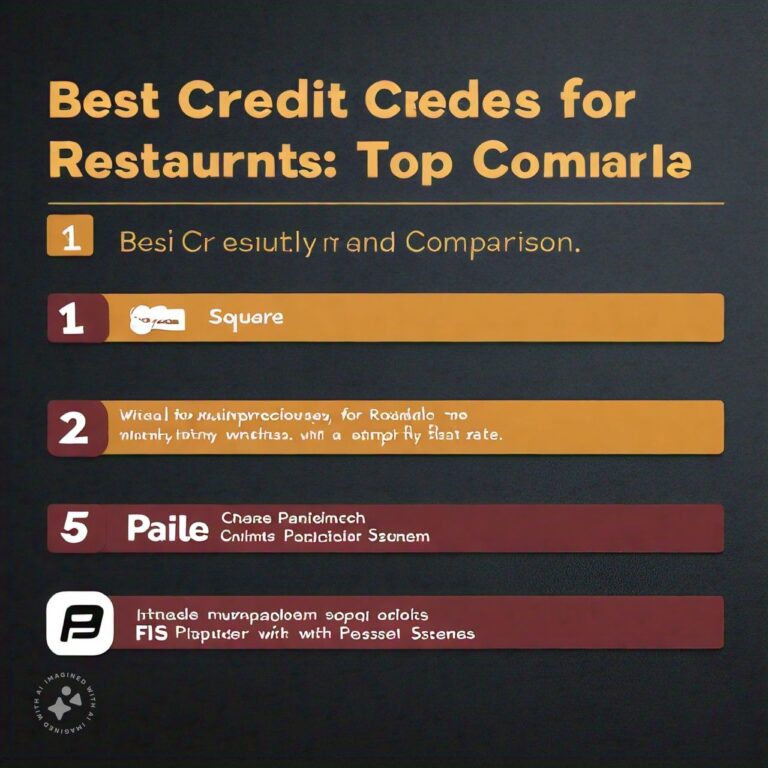Restaurants need a reliable credit card processor that can handle a high volume of transactions and offer competitive rates. With so many options available, it can be overwhelming for restaurant owners to choose the best credit card processor for their business. In this article, we will explore some of the top credit card processors for restaurants and what makes them stand out from the competition.
One of the most important factors to consider when selecting a Best Credit Card Processor for Restaurants. Many processors charge a percentage fee per transaction, which can add up quickly for restaurants with a high volume of sales. However, some processors offer lower rates for restaurants, which can help save money in the long run. Another factor to consider is the ease of use and integration with existing point-of-sale systems. A processor that seamlessly integrates with a restaurant’s POS system can save time and reduce errors in transactions.
Overall, choosing the best credit card processor for a restaurant requires careful consideration of factors such as cost, ease of use, and integration with existing systems. By exploring some of the top processors available, restaurant owners can make an informed decision that will benefit their business and their customers.
Essential Features of Credit Card Processors for Restaurants
Ease of Integration
When selecting a credit card processor for a restaurant, ease of integration is a crucial factor to consider. The processor should be compatible with the restaurant’s point-of-sale (POS) system and should integrate seamlessly with it. This will ensure that the restaurant staff can process credit card payments quickly and efficiently, without any technical difficulties.
Transaction Speed
Transaction speed is another essential feature to look for in a credit card processor for restaurants. Slow transaction times can lead to long wait times for customers, which can negatively impact the restaurant’s reputation. A good credit card processor should be able to process transactions quickly, so that customers can pay and leave without any delays.
Reliability and Uptime
Reliability and uptime are crucial factors when it comes to credit card processing for restaurants. A credit card processor that is down or experiencing technical difficulties can lead to lost sales and frustrated customers. It is important to choose a processor that has a high uptime rate and is reliable, so that the restaurant can process payments without any interruptions.
Security Compliance
Security compliance is an essential feature that cannot be overlooked when choosing a credit card processor for a restaurant. The processor should be compliant with the Payment Card Industry Data Security Standard (PCI DSS) and should have robust security measures in place to protect customer data. This will ensure that the restaurant is not at risk of data breaches or fraud.
Customer Support
Finally, customer support is an essential feature to consider when selecting a credit card processor for a restaurant. The processor should offer excellent customer support, with knowledgeable and responsive staff who can help with any technical issues or questions that may arise. This will ensure that the restaurant staff can process payments smoothly and efficiently, without any interruptions.
Comparing Top Credit Card Processors
Fee Structures
When comparing credit card processors, one of the most important factors to consider is the fee structure. The fees charged by credit card processors can vary widely and can have a significant impact on a restaurant’s bottom line.
Some credit card processors charge a flat fee per transaction, while others charge a percentage of the total transaction amount. Some processors also charge additional fees, such as monthly fees, statement fees, and chargeback fees.
Restaurants should look for a credit card processor that offers transparent and competitive pricing, with no hidden fees. It is also important to consider the types of cards accepted and any additional fees that may be charged for processing certain types of cards.
Hardware and Software Requirements
Another important factor to consider when comparing credit card processors is the hardware and software requirements. Restaurants should look for a processor that offers easy-to-use hardware and software that can integrate seamlessly with their existing point-of-sale system.
Some credit card processors require specific hardware or software, which can be costly and time-consuming to implement. Others offer more flexible solutions that can work with a variety of systems.
Restaurants should also consider the level of support offered by the credit card processor, including training and technical support.
Merchant Services
In addition to processing credit card payments, many credit card processors offer a range of merchant services, such as gift card programs, loyalty programs, and online ordering systems.
Restaurants should consider whether these additional services are important to their business and whether the credit card processor offers them at a reasonable cost.
User Reviews and Testimonials
Finally, it is important to consider the experiences of other restaurant owners and operators when choosing a credit card processor. Reading user reviews and testimonials can provide valuable insights into the strengths and weaknesses of different processors.
Restaurants should look for a credit card processor with positive reviews and a strong reputation for reliability and customer service.
Overall, when comparing top credit card processors for restaurants, it is important to consider the fee structure, hardware and software requirements, merchant services, and user reviews and testimonials. By carefully evaluating these factors, restaurants can choose a credit card processor that meets their needs and helps them grow their business.
